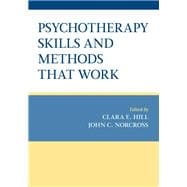
Psychotherapy Skills and Methods That Work
by Hill, Clara E.; Norcross, John C.Buy New
Rent Textbook
Rent Digital
Used Textbook
We're Sorry
Sold Out
How Marketplace Works:
- This item is offered by an independent seller and not shipped from our warehouse
- Item details like edition and cover design may differ from our description; see seller's comments before ordering.
- Sellers much confirm and ship within two business days; otherwise, the order will be cancelled and refunded.
- Marketplace purchases cannot be returned to eCampus.com. Contact the seller directly for inquiries; if no response within two days, contact customer service.
- Additional shipping costs apply to Marketplace purchases. Review shipping costs at checkout.
Summary
Psychotherapy Skills and Methods That Work is the result of a multiyear, interorganizational Task Force commissioned to identify, compile, and disseminate the research evidence and clinical practices on psychotherapist skills and methods used across theoretical orientations. Edited by renowned scholars Clara E. Hill and John C. Norcross, this book provides original research reviews on the effectiveness of 27 specific psychotherapy skills and methods, including affirmation, self-disclosure, role induction, between-session homework, empathic reflections, mindfulness and acceptance, emotion regulation, and cognitive restructuring. Each chapter on a therapy skill or method features clinical examples, diversity considerations, training implications, and bulleted therapeutic practices, while the final chapter summarizes the research evidence for the effectiveness of these skills/methods and emphasizes implications for clinical training and practice.
Forcefully demonstrating what therapists do to help clients change and live more effective lives, Psychotherapy Skills and Methods That Work will serve as a go-to guide for psychotherapy practitioners of all persuasions and professions, as well as graduate students and psychotherapy researchers.
Author Biography
Clara E. Hill, PhD, is Professor of Psychology at the University of Maryland and former president of the Society for Psychotherapy Research and the Society of the Advancement of Psychotherapy/APA Division 29. She was Editor of Journal of Counseling Psychology and Psychotherapy Research. Hill has been awarded the Leona Tyler Award and Outstanding Lifetime Achievement Award (Society of Counseling Psychology), the Distinguished Psychologist Award (Society for the Advancement of Psychotherapy), and the Distinguished Research Career Award (Society for Psychotherapy Research). Her research interests include therapist skills, psychotherapy process/outcome, training and supervision, dream work, meaning in life, and qualitative research.
John C. Norcross, PhD, ABPP, is Distinguished Professor and Chair of Psychology at the University of Scranton, Clinical Professor of Psychiatry at SUNY Upstate Medical University, and a board-certified clinical psychologist. He has cowritten or edited 20 books, including Psychotherapy Relationships That Work, Clinician's Guide to Evidence-Based Practice in Behavioral Health and Addictions, Psychologists' Desk Reference, the Insider's Guide to Graduate Programs in Clinical & Counseling Psychology, and Systems of Psychotherapy: A Transtheoretical Analysis, now in its 9th edition. He has served as president of the American Psychological Association (APA) Division of Clinical Psychology, the APA Division of Psychotherapy, Society for the Exploration of Psychotherapy Integration, and on the Board of Directors of the National Register of Health Service Psychologists.
Table of Contents
Preface
List of Contributors
About the Editors
Chapter 1: Introduction to Psychotherapy Skills and Methods that Work
Clara E. Hill, John C. Norcross, and the Steering Committee
Chapter 2: Affirmation/Validation, Self-Disclosure, Immediacy, and Rupture Repairs
Barry A. Farber, Clara E. Hill, Sarah Knox, Catherine F. Eubanks, J. Christopher Muran, and John C. Norcross
Chapter 3: Questions
Elizabeth Nutt Williams
Chapter 4: Socratic Questioning and Guided Discovery
James C. Overholser and Eleanor Beale
Chapter 5: Empathic Reflection
Robert Elliott, Art Bohart, Dale G. Larson, Peter Muntigl, and Olga Smoliak
Chapter 6: Metaphors
Linda M. McMullen & Dennis Tay
Chapter 7: Interpretations
Sigal Zilcha-Mano, Hadar Fisher, Tohar Dolev-Amit, John R. Keefe, and Jacques P. Barber
Chapter 8: Paradoxical Interventions
Paul R. Peluso and Robert Freund
Chapter 9: Advice, Suggestions, Recommendations
Clara E. Hill, Sarah Knox, and Changming Duan
Chapter 10: Integrating Between-Session Homework
Truls Ryum, Mia Bennion, and Nikolaos Kazantzis
Chapter 11: Silence
Heidi M. Levitt and Zenobia Morrill
Chapter 12: Facilitating Dyadic Synchrony
Dana Atzil Slonim, Christina S. Soma, Xinyao Zhang, Adar Paz, and Zac E. Imel
Chapter 13: Role Induction
Joshua K. Swift, Elizabeth A. Penix, and Ailun Li
Chapter 14: Collaborative Assessment Methods
Filippo Aschieri, Arnold A. P. van Emmerik, Carlijn Wibbelink, and Jan H. Kamphuis
Chapter 15: Routine Outcome Monitoring
Michael Barkham, Kim de Jong, Jaime Delgadillo, and Wolfgang Lutz
Chapter 16: Strength-Based Methods
Christoph Flückiger, Thomas Munder, A. C. Del Re, and Nili Solomonov
Chapter 17: Enhancing Emotion Regulation
Shigeru Iwakabe, Kaori Nakamura, and Nathan C. Thoma
Chapter 18: Chairwork
Antonio Pascual-Leone and Tabarak Baher
Chapter 19: Dream Work and Nightmare Treatments
Patricia T. Spangler and Wonjin Sim
Chapter 20: Mediation, Mindfulness, and Acceptance
Simon B. Goldberg, Christopher Anders, Shannon L. Stuart-Maver, and D. Martin Kivlighan III
Chapter 21: Facilitating Behavioral Activation
Pim Cuijpers, Eirini Karyotaki, Mathias Harrer, and Yvonne Stikkelbroek
Chapter 22: Cognitive Restructuring
Iony D. Ezawa and Steven D. Hollon
Chapter 23: Skills and Methods That Work in Psychotherapy: Research Results, Training Implications, Therapeutic Practices, and Task Force Conclusions
Clara E. Hill, John C. Norcross, and the Steering Committee
Index
An electronic version of this book is available through VitalSource.
This book is viewable on PC, Mac, iPhone, iPad, iPod Touch, and most smartphones.
By purchasing, you will be able to view this book online, as well as download it, for the chosen number of days.
Digital License
You are licensing a digital product for a set duration. Durations are set forth in the product description, with "Lifetime" typically meaning five (5) years of online access and permanent download to a supported device. All licenses are non-transferable.
More details can be found here.
A downloadable version of this book is available through the eCampus Reader or compatible Adobe readers.
Applications are available on iOS, Android, PC, Mac, and Windows Mobile platforms.
Please view the compatibility matrix prior to purchase.
